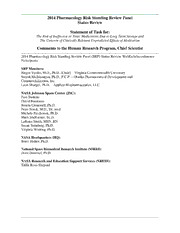
NASA Technical Reports Server (NTRS) 20150008157: 2014 Pharmacology Risk Standing Review Panel PDF
Preview NASA Technical Reports Server (NTRS) 20150008157: 2014 Pharmacology Risk Standing Review Panel
2014 Pharmacology Risk Standing Review Panel Status Review Statement of Task for: The Risk of Ineffective or Toxic Medications Due to Long Term Storage and The Concern of Clinically Relevant Unpredicted Effects of Medication Comments to the Human Research Program, Chief Scientist 2014 Pharmacology Risk Standing Review Panel (SRP) Status Review WebEx/teleconference Participants: SRP Members: Jürgen Venitz, M.D., Ph.D. (Chair) – Virginia Commonwealth University Suresh Mallikaarjun, Ph.D., F.C.P. – Otsuka Pharmaceutical Development and Commercialization, Inc. Leon Shargel, Ph.D. – Applied Biopharmaceutics, LLC NASA Johnson Space Center (JSC): Pam Baskins David Baumann Ronita Cromwell, Ph.D. Peter Norsk, M.D., Dr. med. Michele Perchonok, Ph.D. Mark Shelhamer, Sc.D. LaRona Smith, MSN, RN Susan Steinberg, Ph.D. Virginia Wotring, Ph.D. NASA Headquarters (HQ): Bruce Hather, Ph.D. National Space Biomedical Research Institute (NSBRI): Dorit Donoviel, Ph.D. NASA Research and Education Support Services (NRESS): Tiffin Ross-Shepard 2014 Pharmacology Risk SRP – Status Review Comments to the HRP Chief Scientist On December 3, 2014, the Pharmacology Risk SRP, participants from the JSC, HQ, the NSBRI, and NRESS participated in a WebEx/teleconference. The purpose of the call (as stated in the Statement of Task) was to allow the SRP members to: 1. Receive an update by the Human Research Program (HRP) Chief Scientist or Deputy Chief Scientist on the status of NASA’s current and future exploration plans and the impact these will have on the HRP. 2. Receive an update on any changes within the HRP since the 2013 SRP meeting. 3. Receive an update by the Element or Project Scientist(s) on progress since the 2013 SRP meeting. 4. Participate in a discussion with the HRP Chief Scientist, Deputy Chief Scientist, and the Element regarding possible topics to be addressed at the next SRP meeting Based on the presentations and the discussion during the WebEx/teleconference, the SRP would like to relay the following information to Dr. Shelhamer, the HRP Chief Scientist. 1. The SRP thinks that the pharmacology portfolio has made significant progress in the past year. 2. The SRP is pleased that their previous comments about the in-flight medication use survey, dose tracker initiative, and pharmacology database tasks were acknowledged and are finally underway. The SRP believes these tools will continue to be developed and can be a source of data for future and retrospective studies. 3. The dose tracker is a very useful tool and has a lot of promise. Depending on how well it performs, the SRP thinks it could be broadened to clinical trials, monitoring compliance, etc. 4. While the ad-hoc stability study of in-flight medications may provide some useful data, the lack of ground-based samples is a major limitation. The SRP strongly recommends that for any future medication stability studies, ground samples be collected and stored prospectively in order to provide conclusive and potentially actionable information. 5. The SRP thinks there are several approaches to drug stability studies that can be performed. The information obtained could be placed in a drug stability database. In addition to the NASA space program, a drug stability database could be useful for various organizations such as the World Health Organization (WHO) and certain developing countries to know if a drug may be used safely after the expiration date. The SRP would also suggest that a detailed database on drug stability might be useful for the U.S. Food and Drug Administration (FDA) to predict stability of drugs that are in the same chemical class but have not yet been approved for marketing. 6. The real-time medication analyzer currently under development (Small Business Innovation Research grant: Low Gravity Drug Stability Analyzer (PI: Farquharson, Real Time Analyzers)) should be thoroughly validated, including comparison to the chemical analyzer results of ground and in-flight samples. 2 2014 Pharmacology Risk SRP – Status Review Comments to the HRP Chief Scientist 7. The SRP recommends that the pharmacology discipline collaborate closely with other clinical disciplines on the need for additional assessments of QTc-prolongation liability for medications used in-flight. 3
